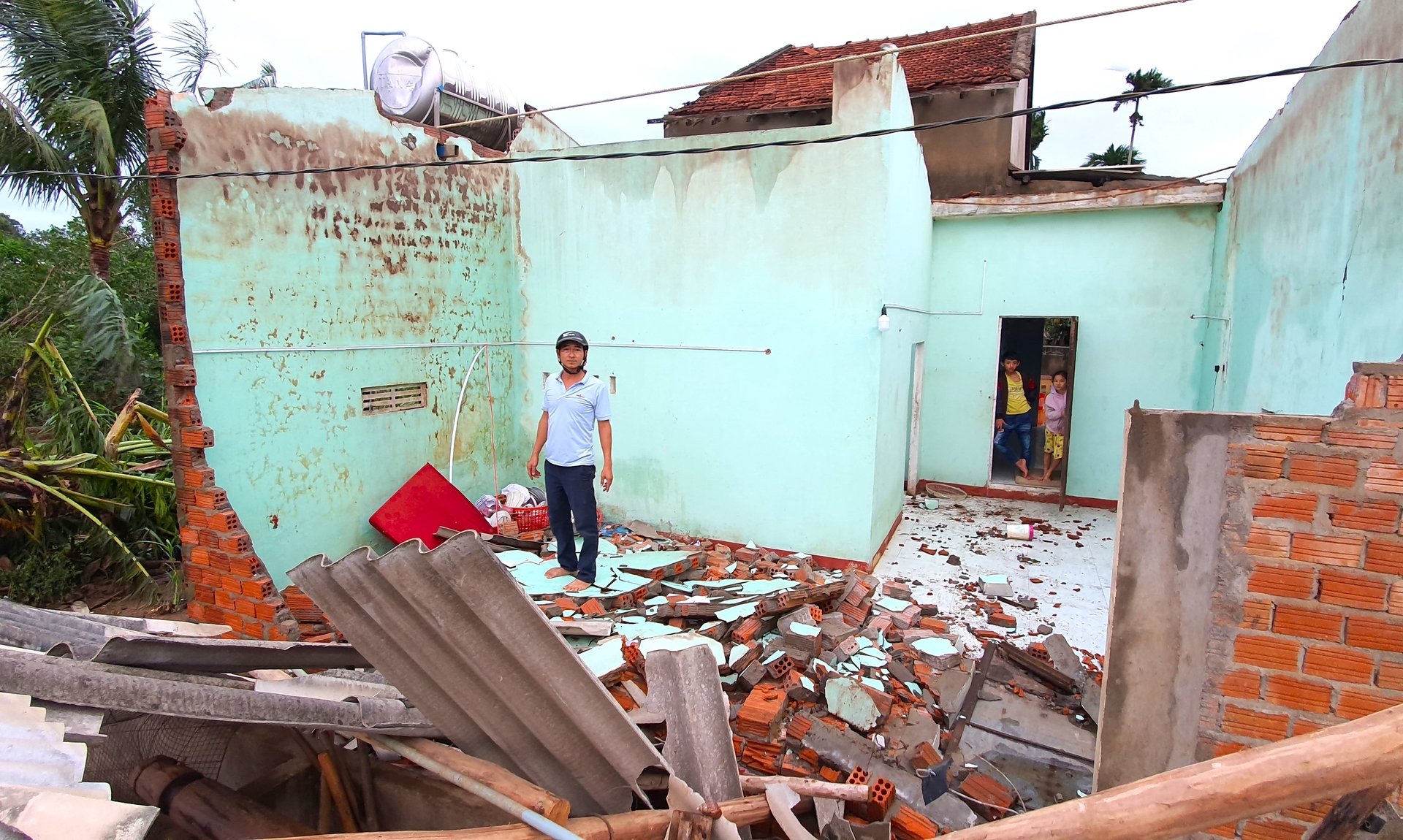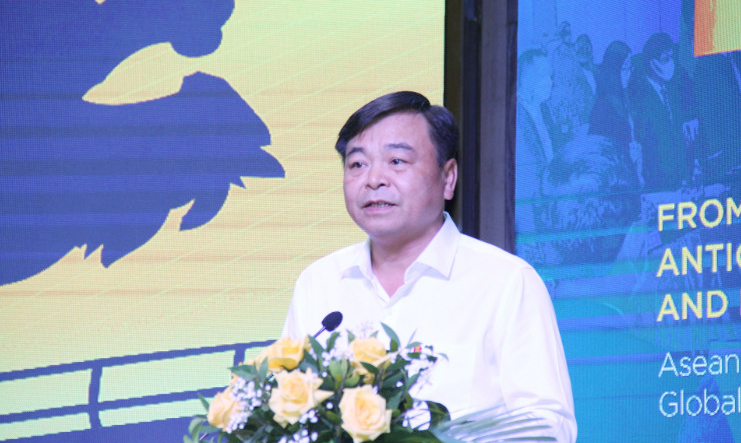May 21, 2025 | 08:52 GMT +7
May 21, 2025 | 08:52 GMT +7
Hotline: 0913.378.918
May 21, 2025 | 08:52 GMT +7
Hotline: 0913.378.918

ASEAN is an area vulnerable to natural disasters. Photo: L.K.
On June 13, in Da Nang City, the 42nd Annual Meeting of the ASEAN Committee on Disaster Management (ACDM) took place.
ASEAN Deputy Secretary General Ekkaphab Phanthavong attended the conference, and more than 60 international delegates who are leaders and officials of disaster prevention and control agencies of 10 ASEAN member countries.
Southeast Asia is one of the most disaster-prone regions in the world. According to data from the United Nations Economic and Social Commission for Asia and the Pacific, natural disasters, including floods, storms, heat waves, droughts, earthquakes, and tsunamis, have caused countries to suffer an average annual economic loss of over US$ 86 billion.
Statistics from 2012 - 2020 have over 2,900 disasters and natural disasters occurring in Southeast Asia, including some large-scale storms such as Typhoon Bopha (2012) in the Philippines; Typhoon Haiyan (2013) in the Philippines; Central Sulawesi earthquake and tsunami (2018) in Indonesia, Typhoon Mangkhut (2018) in the Philippines and Typhoon Damrey (2017) in Vietnam…
In such a context, cooperation between ASEAN member states in disaster management has become a notable highlight in multi-sectoral and multi-sectoral collaboration and commitments in the region and with other stakeholders outside the region. Disaster risk reduction is also one of ASEAN's top priorities to achieve the Sendai Framework for Disaster Risk Reduction and the 2030 Sustainable Development Goals.
The idea of a coordinated ASEAN national response to major natural disasters has been vigorously promoted since the 2004 Indian Ocean earthquake and tsunami that devastated many parts of the country. This disaster can motivate ASEAN to complete the process of building the ASEAN Agreement on disaster management and emergency response, laying the foundation for disaster management activities among countries in the region.
In the order of rotation among ASEAN countries, in 2023, Vietnam will assume the role of Chairman of the ASEAN Committee on Disaster Management (ACDM). In this position, Vietnam has been demonstrating the spirit of being "proactive, active and responsible" in ASEAN cooperation, in which disaster management is an important content in the pillar of the cultural community - the society of ASEAN cooperation.

Deputy Minister Nguyen Hoang Hiep hopes that ASEAN will not only do well in disaster prevention and ensure community safety but also be a leading organization in global disaster risk management. Photo: L.K.
Vietnam has to host a central forum on disaster management in the ASEAN region. Also, this is an opportunity for us to proactively lead, improve efficiency, and position, demonstrating Vietnam's role in ASEAN cooperation in disaster management and building the ASEAN community and ASEAN relations between ASEAN and its partners.
"From the response to early action and resilience: ASEAN towards global leadership in disaster management" is the theme proposed by Vietnam and by disaster management agencies of ASEAN countries that agreed on options for regional cooperation on disaster management in 2023.
"Early action" is a new concept for Vietnam in particular and the region in general, but in essence is activities and interventions right in the pre-disaster prevention stage that agencies in the field of natural disaster prevention and control have been actively deployed based on forecasts, early warnings or risk analysis before natural disasters.
Vietnam has been showing itself as an active and highly respected member of ASEAN. To achieve a specific position in ASEAN, in addition to the national status factor, there is also an essential contribution of national representatives.
In Vietnam, the Ministry of Agriculture and Rural Development is the focal point actively participating in activities under the ASEAN Agreement on Disaster Management and Emergency Response and the Agreement on Establishing the ASEAN Regional Coordination Center for Humanitarian Assistance. in disaster.
According to Deputy Minister of Agriculture and Rural Development Nguyen Hoang Hiep, ASEAN is a fast-growing region, so many problems, such as environment and stability, are challenging. In particular, ASEAN is also an area vulnerable to natural disasters. In 2005, ASEAN established the Disaster Risk Management Committee. It is this committee that, after its operation, has brought great results in ASEAN's joint response.
This year, as the Chairman of the Committee on Disaster Risk Management, Vietnam wants ASEAN to share the same vision, actions, and response in natural disaster prevention and control. Along with that, ASEAN will have to focus more on all issues raised in disaster prevention, from communication, raising awareness, mobilizing resources, supporting information, and taking action when disaster strikes.
“From Vietnam's perspective, we also very much hope that through activities like these, all ASEAN member states will take action, respond, and especially have a stronger commitment to ASEAN not only does well in disaster prevention and control, ensuring community safety but is also truly a leading organization in disaster risk management globally,” said Deputy Minister Nguyen Hoang Hiep.
Translated by Ha Phuc

(VAN) In 2024, over 295 million people across 53 countries and territories faced acute hunger—an increase of almost 14 million people compared to 2023, while the number of people facing catastrophic levels of hunger reached a record high.

(VAN) World Environment Day 2025 (June 5) carries the theme 'Beat Plastic Pollution' continuing to emphasize the global urgency of addressing the plastic waste crisis.

(VAN) This was the assessment shared by experts at the workshop titled 'Assessing the Role and Potential of Low-Emission Rice Production Systems in Vietnam,' held on the morning of May 19.

(VAN) Cai Rong Port is the fisheries control center of Quang Ninh, helping to monitor fishing vessels, combat IUU fishing, and remove the EC's 'yellow card'.

(VAN) The German Agricultural Society (DLG) explores the possibility of establishing a mechanization service center in Vietnam’s Mekong Delta to support farmers in accessing and utilizing advanced machinery.

(VAN) On May 16, the Department of Water Resources Management, in collaboration with the Food and Agriculture Organization of the United Nations (FAO), held a signing ceremony for the GEF-8 project document.

(VAN) Food safety, mechanization, vocational training, and market opening are key areas of cooperation expected between the Vietnamese Government and the Federal Republic of Germany.